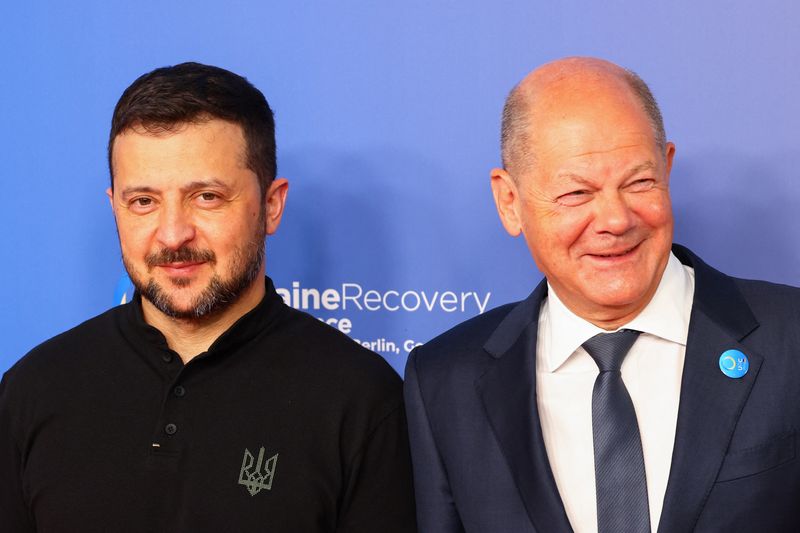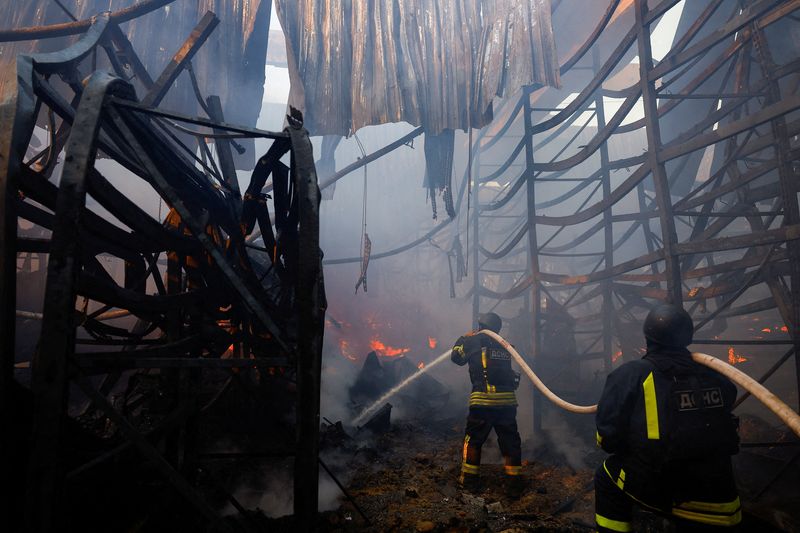Stock Markets
Germany to halve military aid for Ukraine despite possible Trump White House

By Maria Martinez and Holger Hansen
BERLIN (Reuters) -Germany plans to halve its military aid to Ukraine next year, despite concerns that U.S. support for Kyiv could potentially diminish if Republican candidate Donald Trump returns to the White House.
German aid to Ukraine will be cut to 4 billion euros ($4.35 billion) in 2025 from around 8 billion euros in 2024, according to a draft of the 2025 budget seen by Reuters.
Germany hopes Ukraine will be able to meet the bulk of its military needs with the $50 billion in loans from the proceeds of frozen Russian assets approved by the Group of Seven, and that funds earmarked for armaments will not be fully used.
“Ukraine’s financing is secured for the foreseeable future thanks to European instruments and the G7 loans,” German Finance Minister Christian Lindner said on Wednesday at a news conference.
Washington pushed to “front load” the loans to give Ukraine a big lump sum now.
Officials say EU leaders agreed to the idea in part because it reduces the chance of Ukraine being short of funds if Trump returns to the White House.
Alarm (NASDAQ:) bells rang across Europe this week after Trump picked Senator J.D. Vance, who opposes military aid for Ukraine and warned Europe will have to rely less on the United States to defend the continent, as his candidate for vice president.
Trump sparked fierce criticism from Western officials for suggesting he would not protect countries that failed to meet the transatlantic military alliance’s defence spending targets and would even encourage Russia to attack them.
Germany has faced criticism for repeatedly missing a NATO target of spending 2% of its economic output on defence.
DEPLETED MILITARY STOCKS
The stocks of Germany’s armed forces, already run down by decades of underinvestment, have been further depleted by arms supplies to Kyiv.
So far, Berlin has donated three Patriot air defence units to Kyiv, more than any other country, bringing down the number of Patriot systems in Germany to nine.
Germany’s fractious coalition of left-leaning Social Democrats, pro-business liberals and ecologist Greens has struggled to comply with NATO’s spending target due to self-imposed rules that limit the amount of state borrowing they can take on.
Although military aid to Ukraine will be cut, Germany will comply with the NATO target of spending 2% of GDP on defence in 2025, with a total of 75.3 billion euros.
Days after Russia’s 2022 invasion of Ukraine, Chancellor Olaf Scholz announced a “Zeitenwende” – German for historic turning point – with a 100 billion euro special fund to bring the military up to speed.
From this special fund, there will be 22.0 billion euros more for defence, plus 53.3 billion euros in the regular budget, still less than that sought by Defence Minister Boris Pistorius.
The defence budget is set to receive a meagre 1.3 billion euros more than in 2024, far below the 6.7 billion euros requested by Pistorius.
As ever-increasing annual operating costs outpace this rise, the defence ministry is being forced to cut ammunition orders for 2025 by more than half, reduce procurement by 260 million euros and research and development by over 200 million euros.
The budget for 2025 comes with the mid-term financial planning until 2028, the year when the armed forces’ special fund to meet NATO’s minimum spending goals is due to run out and 80 billion will be needed for defence, as noted in the financial plan.
In 2028, there is a gap of 39 billion euros in the regular budget, of which 28 billion euros are needed to comply with the NATO target without the special fund, sources from the finance ministry said.
Decisions on how the hole will be plugged are not likely to be taken until after the 2025 election.
“The 80 billion euros that have been put on display for 2028 simply do not exist,” said Ingo Gaedechens, member of the parliament’s budget committee from the conservative opposition party CDU.

“The coalition is not even trying to cover this up but are openly admitting it.”
($1 = 0.9192 euros)
Stock Markets
Suburban Propane director Logan sells $139k in shares
Stock Markets
Stock market today: S&P 500 closes lower, but posts big weekly win
Stock Markets
TD Bank promotes Laura Nitti to retail market president role

 Forex3 years ago
Forex3 years agoForex Today: the dollar is gaining strength amid gloomy sentiment at the start of the Fed’s week

 Forex3 years ago
Forex3 years agoUnbiased review of Pocket Option broker

 Forex3 years ago
Forex3 years agoDollar to pound sterling exchange rate today: Pound plummeted to its lowest since 1985

 Forex3 years ago
Forex3 years agoHow is the Australian dollar doing today?

 Cryptocurrency3 years ago
Cryptocurrency3 years agoWhat happened in the crypto market – current events today

 World3 years ago
World3 years agoWhy are modern video games an art form?

 Commodities3 years ago
Commodities3 years agoCopper continues to fall in price on expectations of lower demand in China

 Economy3 years ago
Economy3 years agoCrude oil tankers double in price due to EU anti-Russian sanctions

























